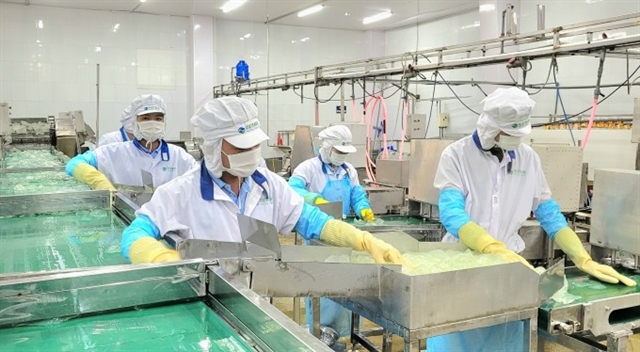Nguyễn Văn Thứ, a bank official who decided to quit his job more than 10 years ago to set up his own company to process aloe vera products, has revived plant cultivation, helping thousands of workers earn better incomes.

Nguyễn Văn Thứ, chairman of GC Food Company. Photo courtesy of the company
Seeing aloe vera plants being eradicated due to falling demand, Nguyễn Văn Thứ, a bank official who decided to quit his job more than 10 years ago to set up his own company to process aloe vera products, has revived the plant cultivation, helping thousands of workers earn better incomes. Việt Nam News speaks to him about the journey.
Inner Sanctum: What inspired you to quit your job as a bank official to set up your own company?
More than 10 years ago, as a senior bank executive, I once came to the central region for a business trip, and I was shocked and upset to see farmers uprooting aloe vera plants and throwing them away as processing firms no longer bought them.
It was really a huge waste.
Aloe vera, or aloe barbadensis, a thick and short-stemmed plant that stores water in its leaves, has a range of therapeutic properties, such as antioxidant and antibacterial properties.
The plant is quite useful for reducing dental plaque, accelerating wound healing, preventing wrinkles, and managing blood sugar, among other benefits.
However there was no advanced processing technologies for aloe vera production.
I started thinking about applying advanced technologies to processing the plant to make finished aloe vera products, hoping that I can help farmers to have stable incomes.
Advanced processing technologies can help increase the value of the plant and make various prized products, such as aloe vera gel, juice, oil and powder.
I spent two years to carefully learn about the market before I decided to quit my banking job to set up my own company, GC Food Company, in early 2011.
Inner Sanctum: Could you tell me about the challenges you faced as you decided to set up your own business?
I built the first aloe vera factory in Đồng Nai Province in 2011.
At the beginning, one of the challenges was that the factory lacked raw materials for production.
The skill level of workers was low, so I had to invite foreign experts to train them or send workers to training centres, which cost a lot of money.
In addition, the factory’s production capacity was limited because of a shortage of machinery since aloe vera products are for a niche market.
Also, the technologies and equipment were not meant for mass production.
Some machines in the production line were not even available.
It costs a great deal to invest in machinery.
The company also sought foreign experts’ assistance to improve processing technologies to meet the stringent requirements of many import markets, which also cost a lot of money.
In 2014, I built a second factory in Ninh Thuận Province.
Inner Sanctum: Why did you choose Phan Rang City to develop raw materials for production?
The climate in Phan Rang City in Ninh Thuận with a tropical wet and dry climate, which is extremely sunny and windy with little rainfall, is ideal for growing aloe vera.
Farmers here also have a long tradition of growing the plant.
The VietFarm factory in Ninh Thuận is now applying Aseptic technology, an advanced food preservation method where the food is sterilised outside the container and then placed in previously sterilised containers and sealed in an aseptic environment.
The factory aims to produce aseptic aloe vera products that meet the stringent requirements of choosy markets such as Japan, South Korea and Eastern Europe.
The company plans to expand its material cultivation area to more than 100ha in the near future, as well as continue to link up with farmers in Phan Rang City to ensure the factory’s capacity.
In Ninh Thuận, aloe vera cultivation could generate an income of around VNĐ300-400 million per hectare per year.
Inner Sanctum: How has the company’s exports evolved over time?
At the beginning, the company got orders from large domestic firms like Vinamilk and Nutifood.
In 2013, it started exporting the products to Japan.
The company now exports its products to 20 countries and territories with 12,000-15,000 tonnes a year.
Our major import markets include Japan, South Korea, and Eastern Europe.
Export orders keep increasing. The company’s aloe vera export revenue reached nearly VNĐ30 billion in the first quarter, up 20 per cent year-on-year.
In addition to aloe vera products, the company also produces and exports coconut jelly.
Amid the world economic crisis, the company has focused on both maximising market share in existing key markets and new markets, and diversifying products to meet the diverse needs of customers. — VNS

Workers at the aloe vera factory in Ninh Thuận Province. Photo courtesy of the company